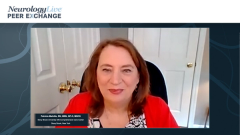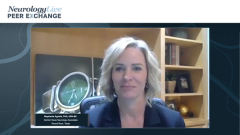
Anti-CD20 Utilization in Relapsing MS
Considerations for using anti-CD20 therapies versus other available treatment options for relapsing multiple sclerosis.
Episodes in this series

Transcript:
Bryan Walker, MHS, PA-C: This is a very effective class of medications, and we use a fair amount of these. Again, we’ve sort of shifted our paradigm with the availability of the different options to us these days to start patients on or to switch them. It’s important to look at this mechanism of action. Of course, there were some of us who have used and may continue to use rituximab as a potential therapeutic intervention for our patients with MS [multiple sclerosis], and for those of us who have used rituximab in the past, this is kind of a no-brainer. We know that this works, we know that it’s well-tolerated, we have a comfort level with it regarding any potential adverse events, especially with regard to infections. We’re not uncomfortable with using this group of medications. What I will say is that we unfortunately, again, are beholden to what some insurers and payers will or will not reimburse for, and it doesn’t include just the medication itself. It includes infusion-related services for the IV [intravenous] medications, not only ocrelizumab, but natalizumab, and it’s not specific to neurology. Our colleagues in rheumatology and gastroenterology who use a lot of infusible medications are running into the same issue where payers are not reimbursing for hospital-based infusion centers. And for an institution that might rely on infusion center reimbursement and payment to justify their existence, that can be very difficult. For institutions that have private infusion centers it might not be that big of a deal, but when you’re talking about a large number of patients who are on infusible medications and then you’re having to scramble to find them another infusion site, sometimes 5 days before they’re due for their infusion, it can be very challenging. That’s an area where I find ofatumumab having a nice niche. I don’t have to worry about identifying an infusion site for them. I don’t have to worry about them trying to schedule a time to go to the infusion center or have someone take them to the infusion center. There’s more flexibility with ofatumumab in that regard. Now, don’t get me wrong, we still use plenty of the infusible medications, but there’s a practicality to using these medications as well, and I’d be interested to hear if anybody else has run into any difficulties in that area.
Patricia Melville, RN, MSN, NP-C, MSCN: We also use a fair amount of ocrelizumab, and we’ve switched some patients to ofatumumab simply for some of the reasons that you outlined, with regard to transportation to the infusion center, getting time off from work. They have to take the full day from work. We’ve also had patients switch because they don’t want to come to the infusion center anymore because they’re concerned about COVID-19 exposure, and other patients being there, having to sit there. At our infusion room, they have to remain there for the 6 hours with a mask on, and they don’t want to wear a mask for 6 hours. Because of that reason we’ve also made some switches as well, and it’s been seamless. The switch has been relatively seamless.
Christen Kutz, PhD, PA-C: There are 2 challenges that we’ve had in our practice with the anti-CD20s. One is a concern that there is potentially a poor immune response to vaccines, especially with the COVID-19 vaccine. There’s a lot of discussion right now about are these patients able to mount an adequate immune response? That’s scenario No. 1 that’s a challenge for us right now. Scenario No. 2 is does being on an anti-CD20 potentially impact future use of natalizumab in a patient who is JC [John Cunningham] virus antibody-positive? Has that put them at a high PML [progressive multifocal leukoencephalopathy] risk? Those are the 2 scenarios that we’re struggling with in our practice.
Amy Perrin Ross, APN, MSN, CNRN, MSCN: I think you’re not alone, Christen, that’s for sure. Indeed, but you bring up some very good points.
Thank you all so much. I would like to thank this wonderful panel, Christen Kutz, Stephanie Agrella, Bryan Walker, and Patricia Melville for this wonderful discussion. I’d like to thank you, as an audience, for watching NeurologyLive® Peer Exchange. If you enjoyed the content, I suggest that you subscribe to the NeurologyLive® newsletters to receive information about upcoming Peer Exchange segments and other content available to you. Thank you all so much.
Transcript edited for clarity.
Newsletter
Keep your finger on the pulse of neurology—subscribe to NeurologyLive for expert interviews, new data, and breakthrough treatment updates.

















